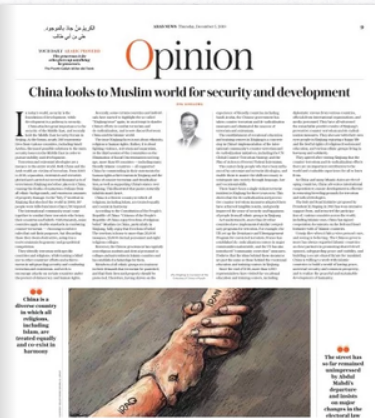On 5 December 2019, the Arab News published a signed article by Counselor Zhu Xinglong of the Embassy of People’s Republic of China in the Kingdom of Saudi Arabia entitled China looks to Muslim world for security and development. The full text is as follows:

In today’s world, security is the foundation of development, while development is a pathway to security.
China attaches great importance to the security in the Middle East, and has recently held the Middle East Security Forum in Beijing. At the forum, nearly 200 representatives from various countries, including Saudi Arabia, discussed the solutions to the hotspot issues in the Middle East, exchanged views on security cooperation in order to pursue stability and development.
Terrorism and extremist thoughts are the menace to the entire human society. China and Islamic countries are victims of terrorism. From 1990 to the end of 2016, separatists, extremists and terrorists plotted and carried out several thousand acts of terrorism in Xinjiang and other places in China, causing great loss to the lives and property of innocent civilians of all ethnic groups. In the "July 5" incident in Xinjiang that shocked the world in 2009, 197 people were killed and more than 1,700 injured.
As terrorists betray their countries and beliefs, the international community should forge a synergy in combating terrorism.
Unfortunately, some countries apply double standards in combating counter-terrorism--choosing to abide by whatever suits its purpose and discarding whatever it finds obstructive, and take it as a tool to maintain hegemonism and geopolitical competition.
They identify terrorism with any specific countries, nations and religions, in the mean time, they turn a blind eye to other countries’ efforts and achievements in safeguarding security and combating terrorism and extremism and want only attacks other countries under the pretext of democracy and human rights.
Recently, some certain countries and individuals have started to hype up the so-called Xinjiang issue again, with the attempt to slander and smear China’s efforts in combating terrorism and de-radicalization and sow discord among China and Islamic world.
The issue Xinjiang faces is not about ethnicity, religion or human rights. Rather, it is about fighting violence, terrorism and separatism. At the Third Committee session on the Committee on the Elimination of Racial Discrimination not long ago, more than 60 countries, including many friendly Islamic countries, all supported China by commending in their statements the achievements in human rights in Xinjiang and the fruits in counter-terrorism and de-radicalization as well as supported China’s stance in Xinjiang-related issues. This has fully illustrated that justice naturally inhabits man’s heart.

China is a multi-religious country. All religions, including Islam, are treated equally and co-exist in harmony in China.
According to the Constitution of the People's Republic of China, “Citizens of the People’s Republic of China enjoy freedom of religious belief.” Muslims in China, particularly in Xinjiang, fully enjoy the freedom of belief, as evidenced by over 20,000 mosques, 29,000 clerical personnel and eight religious colleges in Xinjiang.
Moreover, the Chinese government has sent religious school students and clerical personnel regularly to colleges and universities in Islamic countries for further study and has established scholarships for them.
Members of all ethnic groups are insistent in their demands that violent and terrorist crimes be punished, and that their lives and property should be protected. Therefore, by drawing on advanced experience from friendly countries including Saudi Arabia, the Chinese government has taken counter-terrorism and de-radicalization measures and eliminated the sources of terrorism and extremism.
The establishment of vocational education and training centers in Xinjiang is exactly a concrete step and manifestation of China's implementation of the international community's counter-terrorism and de-radicalization initiatives, including the United Nations Global Counter-Terrorism Strategy and the Plan of Action to Prevent Violent Extremism..
The centers help people who have been influenced by extremist and terrorist ideologies get rid of extremist ideas and terrorism, and enable them master skills to reintegrate into society through learning of languages, law and vocational skills.
There hasn't been a single violent terrorist incident in Xinjiang for three years. This shows that the de-radicalization and preventive counter-terrorism measures adopted there have achieved tangible results, and also greatly improved the sense of security and happiness of the people of all ethnic groups in Xinjiang.
As I understand, over 20 other countries have taken similar compulsory programs for terrorist criminals. For example, the United Kingdom set up the Desistance and Disengagement Programme for convicted terrorists. France established de-radicalization centers in major communities nationwide and the US also has in place "community correction" measures. I believe that the aim and reason for initiating these preventive counterterrorism and de-radicalization measures are just the same as vocational education and training centers in Xinjiang.
Since the end of 2018, over 1,000 representatives have visited the vocational education and training centers, including diplomatic envoys from various countries and regions, international organization officials, and media personnel.
They have all witnessed the remarkable positive results of Xinjiang's preventive counter-terrorism and de-radicalization measures. They also saw with their own eyes people in Xinjiang enjoy a happy life and lawful rights of religious freedom and education and various ethnic groups live in harmony and solidarity.
They agreed after visiting Xinjiang that the counter-terrorism and de-radicalization efforts there are an important contribution to the world and valuable experience for all to learn from.
As China and Islamic countries are developing countries, to ensure development is an effective way to remove the breeding ground for terrorism and radical ideologies. China advocates international cooperation in an active manner to achieve common development with the rest of the world while achieving its own development.
The Belt and Road Initiative proposed by President Xi Jinping in 2013 has won extensive support and attracted active participation of various countries across the world, including Islamic ones. China has signed cooperation documents on the Belt and Road Initiative with 47 Islamic countries, yielding tangible outcomes.
Gossip dies when it hits a wise person's ears and seeing is believing. The Chinese government has always regarded Islamic countries as close partners in promoting shared development, safeguarding peace and stability, and building a community with a shared future for mankind. China is willing to work with Islamic countries to build a world with lasting peace, universal security and common prosperity, and realize the peaceful and sustainable development of humanity.
